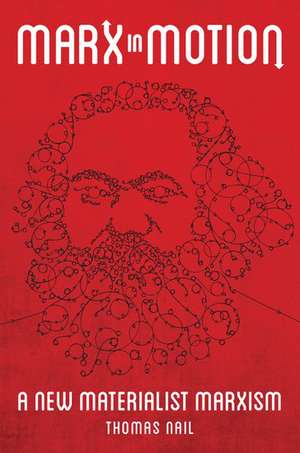Marx in Motion: A New Materialist Marxism
Autor Thomas Nailen Limba Engleză Paperback – 17 sep 2020
Preț: 269.59 lei
Preț vechi: 333.08 lei
-19% Nou
Puncte Express: 404
Preț estimativ în valută:
51.60€ • 53.67$ • 43.24£
51.60€ • 53.67$ • 43.24£
Carte disponibilă
Livrare economică 10-15 februarie
Preluare comenzi: 021 569.72.76
Specificații
ISBN-13: 9780197526484
ISBN-10: 0197526489
Pagini: 264
Dimensiuni: 155 x 231 x 23 mm
Greutate: 0.54 kg
Editura: Oxford University Press
Colecția OUP USA
Locul publicării:New York, United States
ISBN-10: 0197526489
Pagini: 264
Dimensiuni: 155 x 231 x 23 mm
Greutate: 0.54 kg
Editura: Oxford University Press
Colecția OUP USA
Locul publicării:New York, United States
Recenzii
Recommended.
Marx in Motion raises many important and interesting questions.
It is rare to find a genuinely novel reading of Marx and yet that is exactly what Thomas Nail provides in this remarkable book. In an ambitious, pathbreaking, and admirably lucid analysis, Nail offers us a 'new materialist' Marx that both resonates with ecological, feminist, and postcolonial Marxisms and suggests answers to some of the central political problems of our age.
Thomas Nail's Marx in Motion is the most penetrating account of the origins of Marx's overall philosophical outlook to appear this century. Relying on his extensive background in Epicurean philosophy, Nail explores the emergence of Marx's materialist dialectics and his ecological-metabolic views as these first appeared in nascent form in Marx's 1841 doctoral thesis on Epicurus. The result is a revolutionary understanding of Marx's historical ontology of motion, a whole new starting point for the philosophy of praxis.
Why does Marx return in such a lively way after being banned from philosophical and political debate? Nail, who is an excellent reader of Lucretius, reminds us that Marxian thought finds its basis in the powerful ancient materialism. It is of that light that it shines. Beyond the positivist folklore of the Soviet Diamat, beyond the anthropocentric universalism of Marxist humanism after World War II, beyond the surrealist drift of post-structuralism, this book invites us to let ourselves be taken by the ancient materialist rhythm of Marxian concepts, and thus to accompany that philosophical return to political action.
Marx in Motion raises many important and interesting questions.
It is rare to find a genuinely novel reading of Marx and yet that is exactly what Thomas Nail provides in this remarkable book. In an ambitious, pathbreaking, and admirably lucid analysis, Nail offers us a 'new materialist' Marx that both resonates with ecological, feminist, and postcolonial Marxisms and suggests answers to some of the central political problems of our age.
Thomas Nail's Marx in Motion is the most penetrating account of the origins of Marx's overall philosophical outlook to appear this century. Relying on his extensive background in Epicurean philosophy, Nail explores the emergence of Marx's materialist dialectics and his ecological-metabolic views as these first appeared in nascent form in Marx's 1841 doctoral thesis on Epicurus. The result is a revolutionary understanding of Marx's historical ontology of motion, a whole new starting point for the philosophy of praxis.
Why does Marx return in such a lively way after being banned from philosophical and political debate? Nail, who is an excellent reader of Lucretius, reminds us that Marxian thought finds its basis in the powerful ancient materialism. It is of that light that it shines. Beyond the positivist folklore of the Soviet Diamat, beyond the anthropocentric universalism of Marxist humanism after World War II, beyond the surrealist drift of post-structuralism, this book invites us to let ourselves be taken by the ancient materialist rhythm of Marxian concepts, and thus to accompany that philosophical return to political action.
Notă biografică
Thomas Nail is Professor of Philosophy at the University of Denver. He is the author of several books, including Returning to Revolution: Deleuze, Guattari and Zapatismo, The Figure of the Migrant, Theory of the Border, Lucretius I: An Ontology of Motion,Being and Motion, Theory of the Image, and co-editor of Between Deleuze and Foucault.
